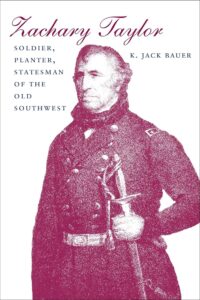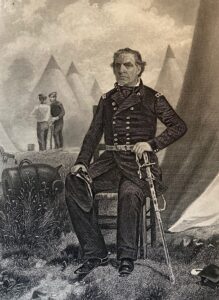Josh Reviews: Zachary Taylor: Soldier, Planter, Statesman of the Old Southwest By Jack Bauer
 While certainly an exacting biography, this book has the unwanted distinction of being a remarkably boring book. And this coming from a person who reads biographies for fun.
While certainly an exacting biography, this book has the unwanted distinction of being a remarkably boring book. And this coming from a person who reads biographies for fun.
K. Jack Bauer was a long time historian and professor, serving in a variety of positions: he was an archivist for the National Archives, a historian with the US Marine Corps Historical Branch, and a member of the Secretary of the Navy’s Advisory Committee on Naval History. He was mainly known as a naval historian, and was a founding member of the North American Society for Oceanic History. He wrote a number of books on naval history in addition to this one on Taylor. This book is not terribly old, published in 1985, but represents pretty much the only exhaustive, single-volume biography of the man.
It is not entirely Bauer’s fault that this book is so hard to slog through, although some of the blame does lie on his shoulders for his decision not to abridge some of the long years of Taylor doing basically nothing on the frontier. Taylor was a career soldier unlike any of the former presidents, and while rising through the ranks the guy served mostly during peace time and until the Mexican war had only a handful of combat commands to his name, including a poorly handled major battle in the Second Seminole war. Bauer paints him as an able but doggedly unimaginative commander, whose best distinction was that he ran a pretty tight ship at the countless frontier forts he served at. Why Bauer felt the need to explain in detail every single reassignment when Taylor lacked even major feuds with other officers to break the monotony I do not know. The first half of this book could be shortened considerably to make the same points.
The other issue is that, as has been pointed out, Taylor is a boring dude, and whatever personal thoughts that might color that have been lost when the Union burned his descendant’s farm. I wouldn’t hold much hope that whatever papers existed would markedly change the review of his personality – Taylor was honestly just not that interesting, in many ways a classic career army officer; he was dubbed “Old Rough and Ready” by the men under his command.

This book gets a bit more interesting once Taylor finally enters the public sphere when he is chosen to lead the Army of Occupation (his choice of name) in the Mexican War. Bauer gives us the best portrait of the man here, one who chose to command with an extreme laissez faire attitude ill-suited to a great commander. Still, thanks to the competency of the men under his command and the poor quality of Mexican troops and leaders, Taylor scored the successes necessary to procure for the United States, ultimately, everything from Colorado to California, so Taylor’s contribution to American history is impossible to ignore.
Bauer does a good job looking at Taylor’s weaknesses, which are more numerous than his strengths, and what led to the gaffe-prone ‘non-partisan’ would-be Jefferson emulator to the presidency. The Whigs were more desperate for a candidate than they were for a good politician, and Taylor’s popularity, even if it was undeserved, positioned him well for the presidency. So what does Taylor offer to the historian, then? A good look at the Mexican war and the split sectional issues of the US in the late 1840s-50s. His ascendancy is more notable for being leveraged by the Whigs than it was for anything remarkable about the man. Bauer also does a competent job of analyzing Taylor’s short presidency – 16 months – and the ways in which the naive politician was unprepared for Washington. Those sixteen months were marred by Taylor’s weak cabinet and his administration’s inability to work with congress. While Bauer mentions Taylor was planning on shaking up his cabinet, in the end Taylor’s death would doom his administration to a mediocre at best station, almost as uneventful and uninteresting as the rest of Taylor’s life.
If you’re looking for a biography of Taylor, this might be your only choice that qualifies as a full biography (which mattered to me), but it is not perfect. It doesn’t have as much to recommend it as Ketcham’s long, detailed, but deep bio on Madison, although both can be a bit of a slog. I suggest going into it knowing that you might want to kind of skim a good chunk of it.

